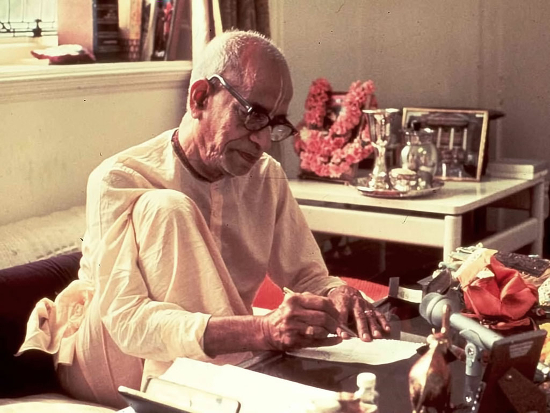
SRIMAD-BHAGAVATAM 7 CHAPTER 9 TEXT 44
prāyeṇa deva munayaḥ sva-vimukti-kāmā
maunaṁ caranti vijane na parārtha-niṣṭhāḥ
naitān vihāya kṛpaṇān vimumukṣa eko
nānyaṁ tvad asya śaraṇaṁ bhramato ’nupaśye
TRANSLATION
My dear Lord Nṛsiṁhadeva, I see that there are many saintly persons indeed, but they are interested only in their own deliverance. Not caring for the big cities and towns, they go to the Himalayas or the forest to meditate with vows of silence [mauna-vrata]. They are not interested in delivering others. As for me, however, I do not wish to be liberated alone, leaving aside all these poor fools and rascals. I know that without Kṛṣṇa consciousness, without taking shelter of Your lotus feet, one cannot be happy. Therefore I wish to bring them back to shelter at Your lotus feet.
PURPORT
This is the decision of the Vaiṣṇava, the pure devotee of the Lord. For himself he has no problems, even if he has to stay in this material world, because his only business is to remain in Kṛṣṇa consciousness. The Kṛṣṇa conscious person can go even to hell and still be happy. Therefore Prahlāda Mahārāja said, naivodvije para duratyaya-vaitaraṇyāḥ: “O best of the great personalities, I am not at all afraid of material existence.” The pure devotee is never unhappy in any condition of life. This is confirmed in Śrīmad-Bhāgavatam (6.17.28):
nārāyaṇa-parāḥ sarve
na kutaścana bibhyati
svargāpavarga-narakeṣv
api tulyārtha-darśinaḥ
“Devotees solely engaged in the devotional service of the Supreme Personality of Godhead, Nārāyaṇa, never fear any condition of life. For them the heavenly planets, liberation and the hellish planets are all the same, for such devotees are interested only in the service of the Lord.”
For a devotee, being situated in the heavenly planets and being in the hellish planets are equal, for a devotee lives neither in heaven nor in hell but with Kṛṣṇa in the spiritual world. The secret of success for the devotee is not understood by the karmīs and jñānīs. Karmīs therefore try to be happy by material adjustment, and jñānīs want to be happy by becoming one with the Supreme. The devotee has no such interest. He is not interested in so-called meditation in the Himalayas or the forest. Rather, his interest is in the busiest part of the world, where he teaches people Kṛṣṇa consciousness. The Kṛṣṇa consciousness movement was started for this purpose. We do not teach one to meditate in a secluded place just so that one may show that he has become very much advanced and may be proud of his so-called transcendental meditation, although he engages in all sorts of foolish materialistic activity. A Vaiṣṇava like Prahlāda Mahārāja is not interested in such a bluff of spiritual advancement. Rather, he is interested in enlightening people in Kṛṣṇa consciousness because that is the only way for them to become happy. Prahlāda Mahārāja says clearly, nānyaṁ tvad asya śaraṇaṁ bhramato’nupaśye: “I know that without Kṛṣṇa consciousness, without taking shelter of Your lotus feet, one cannot be happy.” One wanders within the universe, life after life, but by the grace of a devotee, a servant of Śrī Caitanya Mahāprabhu, one can get the clue to Kṛṣṇa consciousness and then not only become happy in this world but also return home, back to Godhead. That is the real target in life. The members of the Kṛṣṇa consciousness movement are not at all interested in so-called meditation in the Himalayas or the forest, where one will only make a show of meditation, nor are they interested in opening many schools for yoga and meditation in the cities. Rather, every member of the Kṛṣṇa consciousness movement is interested in going door to door to try to convince people about the teachings of Bhagavad-gītā As It Is, the teachings of Lord Caitanya. That is the purpose of the Hare Kṛṣṇa movement. The members of the Kṛṣṇa consciousness movement must be fully convinced that without Kṛṣṇa one cannot be happy. Thus the Kṛṣṇa conscious person avoids all kinds of pseudo spiritualists, transcendentalists, meditators, monists, philosophers and philanthropists.

